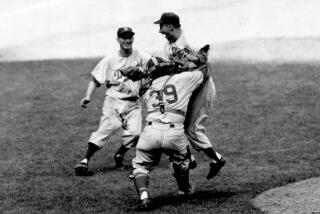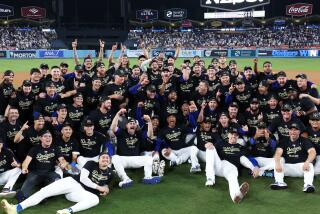Dodgers Pitch to Clark . . . It’s His Pitch : 3-Run Homer in 9th Gives the Cardinals 7-5 Win and Pennant
- Share via
Manager Whitey Herzog, angry because his team had to watch some marching bands perform when he wanted to take infield practice, refused to send the Cardinals out for pregame introductions Wednesday at Dodger Stadium.
They need no introduction now. Just call them National League champions.
Jack Clark, challenged to beat the band when Dodger Manager Tom Lasorda decided not to walk him with first base open in the ninth inning and two out, stopped the music and the season for the Dodgers with a monster mash--a three-run home run off Tom Niedenfuer that gave the Cardinals a 7-5 win and the playoffs, 4 games to 2.
For the second straight game, the Cardinals exploded with the suddenness of cymbals crashing, both times against Niedenfuer. On Monday in St. Louis, it was Ozzie Smith, the wisp who won Game 5 with a ninth-inning home run and who probably cinched the playoff Most Valuable Player Award on Wednesday with a game-tying triple off Niedenfuer in the seventh inning.
This time, it was Clark, a Clydesdale among thoroughbreds, who struck the climactic note in what was a stirring symphony of a ballgame, filled with flourishes such as Mike Marshall’s tiebreaking home run in the eighth, after the Cardinals had rallied from a 4-1 deficit in the seventh.
Marshall’s homer, an opposite-field drive off Cardinal reliever Todd Worrell that just cleared the right-field fence, had put the Dodgers three outs away from what would have been the first Game 7 ever played in Dodger Stadium.
Instead, Clark--whose sore ribs had limited him to one home run since Aug. 16--pinned the Dodgers with a fourth straight loss after the Dodgers had won the first two games of the playoffs here before losing three in St. Louis and the fourth here before a crowd of 55,208.
“I can’t answer that,” Clark said when asked if Lasorda had made the right choice in pitching to him.
“Over the years, I’ve been an easy out for him (Niedenfuer). But they were coming after me, and I hoped they would.
“There are no guarantees, but I knew what my job was.”
On Niedenfuer’s first pitch, a waist-high fastball that split the heart of the plate, Clark sent a missile halfway up the seats in the left-field pavilion.
“As soon as I heard the ball hit the bat, my ears were ringing,” said Andy Van Slyke, who was on deck when Clark connected. “The ball looked like a laser beam. It was serious Star Wars.”
It was a mission accomplished for Clark, a long day’s journey into night for Niedenfuer.
“He did his job, I didn’t do mine,” the Dodger reliever said afterward, his back pinned to his locker by a media horde, just as it had been in Busch Stadium two days before.
“How would you feel?” he said. “It’s just like the other day, when Ozzie hit one. It’s not the highlight of my career, if that’s what you mean.”
Obviously, it never will earn a spot on the Wall of Fame in Lasorda’s office, either. The Dodger manager, his eyes rimmed with red and his head buried in his hands, received reporters in his office after first meeting there with team owner Peter O’Malley, who was accompanied by Los Angeles Mayor Tom Bradley.
“Tough, God, tough--just breaks my heart,” said Lasorda, who softly uttered a curse.
“It’s the easiest thing in the world to say I should have walked him (Clark). But if he hit a deep fly to center field and they caught it for the third out, not one guy would say I should have walked him.”
Niedenfuer said it wasn’t his decision to make. Catcher Mike Scioscia, who had flung his mitt to the dugout floor when the inning was over, defended the decision.
“I don’t think it was the wrong choice at all,” said Scioscia, ever the loyal soldier. “I don’t think the pitch selection was bad, either.
“I think Tom just tried to overthrow it. He was too pumped up, and the ball went down the middle instead of outside, where we wanted it to go.”
Two innings before, Niedenfuer had blazed a 2-and-2 fastball past Clark, then struck out the next batter, Andy Van Slyke. That had ended a three-run Cardinal rally punctuated by Willie McGee’s two-run single off Dodger starter Orel Hershiser and by Smith’s triple off Niedenfuer that reached the right-field fence on one bounce.
Lasorda said the fact that Clark had struck out influenced his decision to pitch to him in the ninth. The inning had begun when the pinch-hitting Cesar Cedeno struck out and league batting champion McGee--as quiet on the field in this series as he always is off--lined his third straight single.
McGee stole second, and Niedenfuer walked Smith on a full count. After Herr tapped out to first baseman Greg Brock, moving the runners over, up came Clark. He had never batted with a pennant on the line in San Francisco, which had served as the Elba of his career for the first eight-plus seasons.
To Herr, that was inconsequential. He said his heart jumped when he saw that the Dodgers had chosen to pitch to Clark.
“I felt great when I saw they were going to pitch to Jack,” he said.
The last three times Clark had come to the plate with a man in scoring position and first base open, Lasorda had ordered him walked. But this time, the left-handed Van Slyke was the next batter, not Cedeno.
“If I had a left-handed pitcher up, then it would have been a different story,” said Lasorda, who did have a left-hander ready--Jerry Reuss--but didn’t use him.
While Lasorda’s stratagem failed him, Herzog made his second bold decision in two games and came out a winner both times.
Herzog, who lifted starter Bob Forsch in Game 5 after a long foul ball by Brock and wound up getting 5 shutout innings from his bullpen, ordered Worrell to intentionally walk Pedro Guerrero with Mariano Duncan on third with a triple, Duncan’s third hit of the day, in the seventh inning. Duncan had also hit a chopper that Cardinal starter Joaquin Andujar lost in the sun and misplayed for an error, leading to two unearned runs in the fifth.
Guerrero had been given free passes all series--this was his sixth--but this time the next batter was Bill Madlock. On his previous at-bat, Madlock had homered off Andujar, his third home run in three games, and also had singled home a first-inning run despite a sore left thumb he had jammed diving for a ground ball in Game 5.
“An amazing move,” Marshall said. “I thought Whitey would walk both guys (Guerrero and Madlock) to load the bases. But it worked this time.”
It couldn’t have worked any better, as Madlock grounded into an inning-ending double play.
Herzog knew he was taking a chance with Madlock. “Well, the choice was to take two shots with a man on third to get two outs or shoot craps and hope to get a ground ball,” he said. “Worrell made a good pitch, and we were out of the inning.”
And despite Marshall’s home run on the Dodgers’ next at-bat, the Dodgers were just about out of a season, one in which few people had figured back in April that they’d still be playing well into October.
“We came a long way,” Scioscia said, “but it doesn’t mean much when you don’t win it all.
“It’s an empty feeling. We don’t have anything to be embarrassed about, but when you don’t win it all, you might as well end up in sixth place. It’s a game of all or nothing.”
It’s also a game that will be played again, another day.
“We’ll be back,” Lasorda whispered hoarsely. “We’ll be back. You can bet on it, we’ll be back.”
On this day, Lasorda was the last guy who should have been making a wager.
More to Read
Are you a true-blue fan?
Get our Dodgers Dugout newsletter for insights, news and much more.
You may occasionally receive promotional content from the Los Angeles Times.










